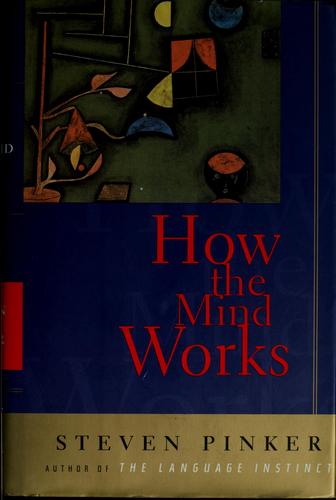How the Mind Works
By Steven Pinker, Mel Foster and 3

"How the Mind Works" was published by Norton in 1997 - New York, it has 660 pages and the language of the book is English.
“How the Mind Works” Metadata:
- Title: How the Mind Works
- Authors: Steven PinkerMel Foster3
- Language: English
- Number of Pages: 660
- Publisher: Norton
- Publish Date: 1997
- Publish Location: New York
“How the Mind Works” Subjects and Themes:
- Subjects: ➤ Nonfiction - Philosophy - Neuropsychology - Psychology - Cognitive neuroscience - Natural selection - Human evolution - Evolution - Cognition - Selection (Genetics) - Physiology - Kognitive Psychologie - Neurosciences cognitives - Genetic Selection - Bewusstsein - Sélection naturelle - Neuropsychologie - Évolution - Kognitionswissenschaft - Cognitieve processen - Psychologie - Geist - Gehirn - Homme - Kognitiver Prozess - Biological Evolution - Fizjologia - Filozofia umysłu - Ewolucja - Mózg - Poznanie - Umysł - Teoria - Neuropsychologia - Science - Psicologi a gene tica - Mente y cerebro - Mente y cuerpo - Neurociencia cognitiva - Neurolingüística
Edition Specifications:
- Format: Hardcover
- Pagination: xii, 660 p. ;
Edition Identifiers:
- The Open Library ID: OL24747142M - OL477829W
- Online Computer Library Center (OCLC) ID: 36379708
- Library of Congress Control Number (LCCN): 97001855
- ISBN-13: 9780393045352
- ISBN-10: 0393045358
- All ISBNs: 0393045358 - 9780393045352
AI-generated Review of “How the Mind Works”:
"How the Mind Works" Table Of Contents:
- 1- Standard equipment
- 2- Thinking machines
- 3- Revenge of the nerds
- 4- The mind's eye
- 5- Good ideas
- 6- Hotheads
- 7- Family values
- 8- The meaning of life.
"How the Mind Works" Description:
The Open Library:
In this book, Steven Pinker explains what the mind is, how it evolved, and how it allows us to see, think, feel, laugh, interact, enjoy the arts, and ponder the mysteries of life. How the Mind Works explains many of the imponderables of everyday life. Why does a face look more attractive with makeup? How do "Magic-Eye" 3-D stereograms work? Why do we feel that a run of heads makes the coin more likely to land tails? Why is the thought of eating worms disgusting? Why do men challenge each other to duels and murder their ex-wives? Why are children bratty? Why do fools fall in love? Why are we soothed by paintings and music? And why do puzzles like the self, free will, and consciousness leave us dizzy? The arguments in the book are as bold as its title. Pinker rehabilitates unfashionable ideas, such as that the mind is a computer and that human nature was shaped by natural selection. And he challenges fashionable ones, such as that passionate emotions are irrational, that parents socialize their children, that creativity springs from the unconscious, that nature is good and modern society corrupting, and that art and religion are expressions of our higher spiritual yearnings.
Read “How the Mind Works”:
Read “How the Mind Works” by choosing from the options below.
Search for “How the Mind Works” downloads:
Visit our Downloads Search page to see if downloads are available.
Borrow "How the Mind Works" Online:
Check on the availability of online borrowing. Please note that online borrowing has copyright-based limitations and that the quality of ebooks may vary.
- Is Online Borrowing Available: Yes
- Preview Status: restricted
- Check if available: The Open Library & The Internet Archive
Find “How the Mind Works” in Libraries Near You:
Read or borrow “How the Mind Works” from your local library.
- The WorldCat Libraries Catalog: Find a copy of “How the Mind Works” at a library near you.
Buy “How the Mind Works” online:
Shop for “How the Mind Works” on popular online marketplaces.